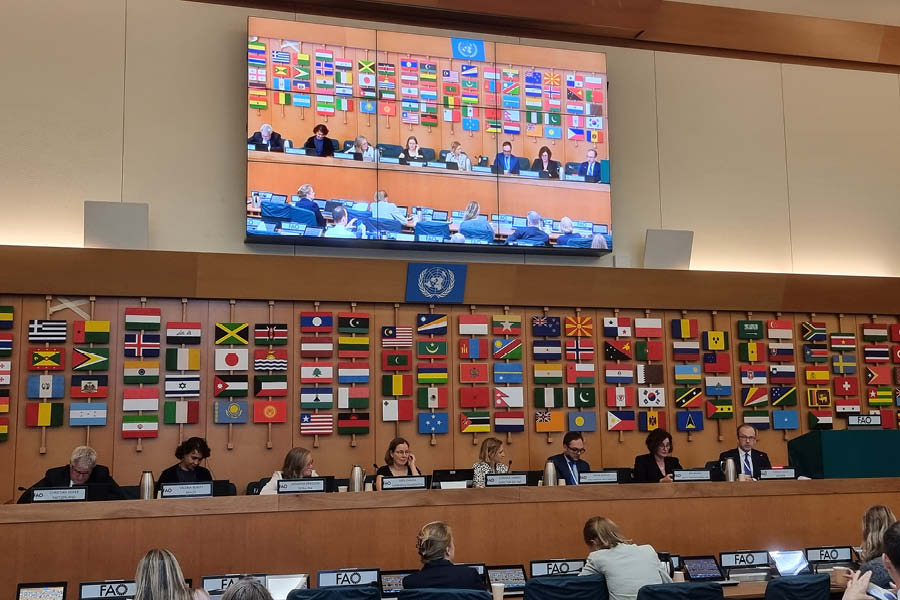The role of national FAO committees and multi-stakeholder approaches
During the event, National FAO Committees were showcased as critical platforms for fostering multi-stakeholder collaboration to address the complexities of transforming agrifood systems. These committees are pivotal in bridging diverse perspectives to create coherent food systems policies.
Christian Hofer, State Secretary of the Swiss Federal Office for Agriculture, presented Switzerland’s committee, established in 1947, as a long-standing example of how structured platforms enable inclusive dialogue and consensus-building at the national level. Diverse actors shape coherent and comprehensive policies that align with national needs and global frameworks.
Similarly, Frederik Alfer, Deputy Director-General at the Ministry for Rural Affairs and Infrastructure of Sweden and Valéria Burity, Brazil’s Extraordinary Secretary for the Fight Against Hunger, presented their national committee models, emphasising the power of collaborative approaches to tackle systemic challenges. For instance, Sweden’s FAO Committee ensures that policies integrate environmental sustainability, while Brazil uses its FAO Committee to address food security and nutrition comprehensively. By fostering trust and cooperation among stakeholders, these platforms enhance the implementation of CFS Voluntary Guidelines and other global policies, ensuring they are tailored to local contexts.
Moreover, the participatory approach strengthens ownership and accountability, promoting sustainable and inclusive solutions to food system challenges. Inclusive collaboration drives innovation and compromise, enabling countries to build equitable and resilient food systems aligned with global sustainability goals.
Policy implementation and success stories
Effective policy implementation emerged as a recurring theme, with Brazil demonstrating success through programmes like “Zero Hunger” and “Brazil Without Hunger”. By incorporating the CFS Voluntary Guidelines into its legal frameworks and involving civil society, Brazil used collaborative planning to address hunger and inequality while addressing the specific needs of vulnerable groups.
Katarina Eriksson, Director of Food for Development at Tetra Pak, emphasised the private sector’s role with initiatives in Colombia and Yemen. In Colombia, a dairy hub in post-conflict regions improved milk production and smallholder farmers’ incomes, supporting sustainable development and peacebuilding. In Yemen, Tetra Pak worked on school nutrition programs by supplying fortified milk and addressing malnutrition among children in conflict-affected areas. These examples show how partnerships between governments, private companies, and international organisations can drive meaningful change in agriculture and nutrition.
Panellists stressed that effective policy implementation requires deliberate effort to engage all relevant actors. Leveraging their strengths fosters holistic solutions to address systemic challenges and improve the livelihoods of vulnerable populations.
Challenges and opportunities in collaborative approaches
While there are benefits from multi-stakeholder collaboration, inherent challenges also exist.
One key challenge is balancing the diverse priorities of stakeholders, often leading to conflicts or slow decision-making. Building trust is crucial, especially when the interests of governments, civil society, and the private sector do not fully align. For example, Martin Sonnevelt, Chairman of the Swiss National FAO Committee and Mr. Alfer pointed out the importance of institutional structures that facilitate dialogue and ensure equitable participation. Without such structures, multi-stakeholder processes risk becoming dominated by more powerful actors, sidelining the voices of smaller or marginalised groups.
Another challenge discussed was the vulnerability of collaborative frameworks to political changes. Brazil’s setbacks during political upheavals illustrate the need for strong governance mechanisms and protection of participatory processes to ensure their continuity and effectiveness, regardless of political transitions.
Despite these challenges, opportunities for collaboration also exist. Investments in education, research, and technology transfer are critical for empowering stakeholders and enhancing productivity. Innovations such as digital platforms for data sharing and technology-driven agricultural solutions can amplify the collaborative effort’s impact.
Finally, the event emphasised the importance of global platforms like CFS in fostering international cooperation and knowledge exchange. By providing a space for stakeholders to share best practices and learn from each other’s experiences, these platforms play a vital role in driving collective action toward sustainable food systems.
The discussions concluded with a call to strengthen such collaborative efforts, ensuring that they are inclusive, resilient, and aligned with the broader goals of sustainable development.
Written by David Mingasson, SIANI reporter
